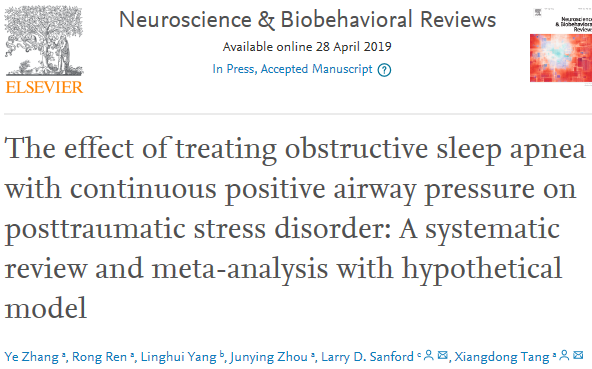
Recently, Prof. Tang Xiangdong’s team from the Neurobiological Testing Center/Sleep Medicine Center of WCH published a paper in the leading journal, Neuroscience & Biobehavioral Reviews (5-year impact factor: 10.016). The first author is postdoctor Zhang Ye, the corresponding author is Prof. Tang Xiangdong, and the first author’s institute is West China Hospital, Sichuan University.
According to the previous researches by Prof. Tang Xiangdong's team, more than 70% of such patients suffered from the co-comorbidity of PTSD and OSA. A hypothesis model for the pathophysiology of the co-morbidity of these two diseases was proposed in combination with recent research results. It was found that, the first-line treatment of OSA, “CPAP” will effectively alleviate the psychiatric symptoms of PTSD while improving the sleeping and breathing events of the patients with the co-comorbidity of PTSD and OSA. Accordingly, this research proposed a theoretical model for the first time that CPAP could improve the sleeping disturbance by correcting the REM sleeping and breathing events of the patients with the co-comorbidity of PTSD and OSA, and contribute to the fading of relevant emotion memories arising from the trauma for the patients suffered from PTSD.
According to the previous researches by Prof. Tang Xiangdong's team, more than 70% of such patients suffered from the co-comorbidity of PTSD and OSA. A hypothesis model for the pathophysiology of the co-morbidity of these two diseases was proposed in combination with recent research results. It was found that, the first-line treatment of OSA, “CPAP” will effectively alleviate the psychiatric symptoms of PTSD while improving the sleeping and breathing events of the patients with the co-comorbidity of PTSD and OSA. Accordingly, this research proposed a theoretical model for the first time that CPAP could improve the sleeping disturbance by correcting the REM sleeping and breathing events of the patients with the co-comorbidity of PTSD and OSA, and contribute to the fading of relevant emotion memories arising from the trauma for the patients suffered from PTSD.
The link of the article: https://doi.org/10.1016/j.neubiorev.2019.03.019